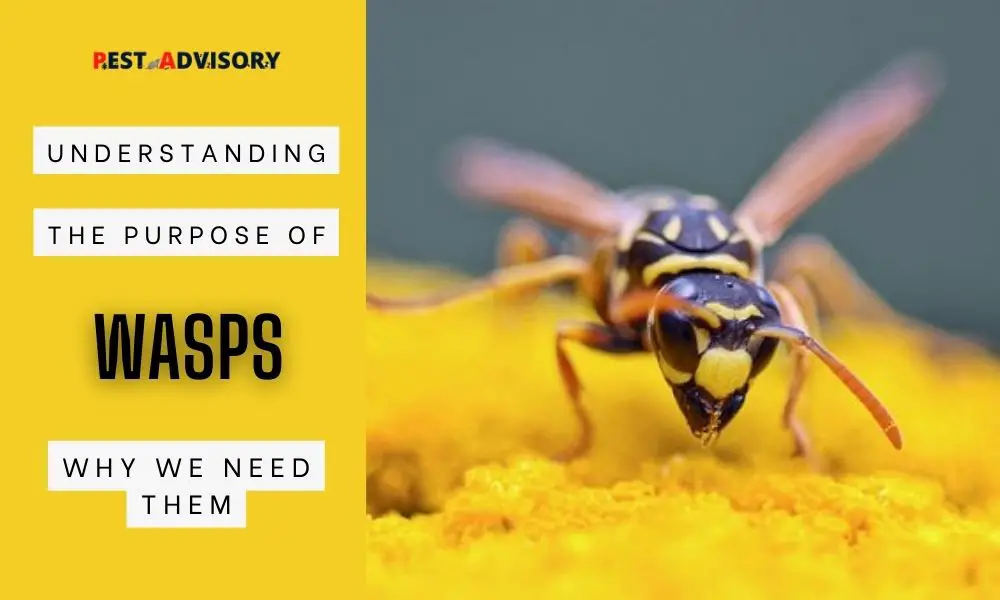Wasps are often viewed as pests that ruin outdoor activities or deliver painful stings. However, these insects play a vital role in maintaining the balance of our ecosystem.
As predators and pollinators, wasps contribute to the health and growth of plants, control populations of other insects, and provide food for other animals.
In this article, we will explore the often-misunderstood world of wasps and discover why they are an essential part of our natural environment.
Important Note: If you're tired of pests and want a reliable solution, then you should definitely consider seeking help from a professional pest control company. DIY solutions can be effective, but if you're dealing with a significant pest infestation, you don't want to rely solely on DIY methods. Pest control companies typically don't charge huge fees. You can fill out this form to receive free quotes from the top local pest control companies, and compare the quotes and see for yourself. Then, finally, your pest problems will be eliminated for good.
Why Wasps are Important to Our Ecosystem?
Wasps are important to our ecosystem because they control the populations of other insects, act as pollinators, and provide food for other animals. They contribute to the health and growth of plants, making them a crucial part of the natural food chain.
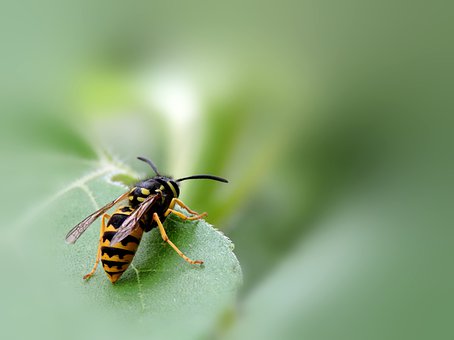
What is the Purpose of a Wasp
Ecological Functions of Wasps
Predators
Wasps are natural predators that play a critical role in regulating populations of other insects.
They prey on a wide variety of insects and other invertebrates, such as caterpillars, aphids, and spiders.
This helps to prevent outbreaks of pests that can damage crops and harm other plant life.
Pollinators
Wasps also act as pollinators for some plant species.
While they are not as efficient at pollinating as bees, wasps have hairy bodies that can pick up and distribute pollen as they move from flower to flower.
Some wasp species are specialized pollinators that are essential for the survival of specific plant species.
Decomposers
In addition to predation and pollination, some species of wasps contribute to the decomposition of organic matter by scavenging and nest-building.
They play an important role in breaking down dead animals and other organic matter, which helps to maintain healthy soil and nutrient cycles in the ecosystem.
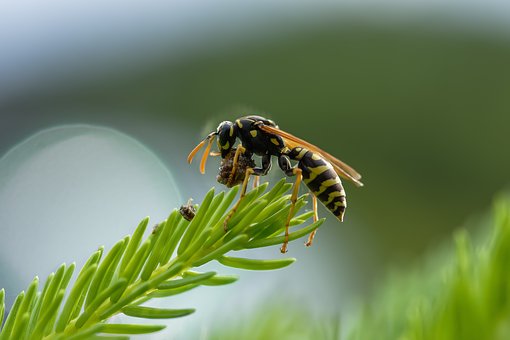
Social Functions of Wasps
Social Insects
Wasps are social insects that live in organized communities called colonies.
These colonies are usually composed of one or more queens, several hundred female workers, and sometimes male drones.
Within the colony, there is a division of labor, with each member having a specific role to play.
Colonies Structure
Wasps have a queen in their colony like bees. The queen’s main role is to lay eggs and establish and maintain the colony’s social structure.
She is typically the largest member of the colony and is responsible for producing all the offspring.
The female workers are responsible for tasks such as building the nest, caring for the young, and foraging for food. Male drones have only one purpose: to mate with the queen.
Nest Building
Another important social function of wasps is nest-building. Wasps build nests out of materials such as mud, wood fibers, and paper. It’s a very fascinating thing how wasps build their nests.
The nest is constructed by female workers and is often a complex structure with multiple chambers for different functions, such as nurseries for the young and storage areas for food.
Defensive Behavior
In addition to their social structure and nest-building, wasps are also known for their defensive behavior.
They will aggressively defend their nests and colony members using their stingers, which can be painful and even dangerous to humans.
However, this behavior also helps to protect the colony from predators and ensures the survival of the group.
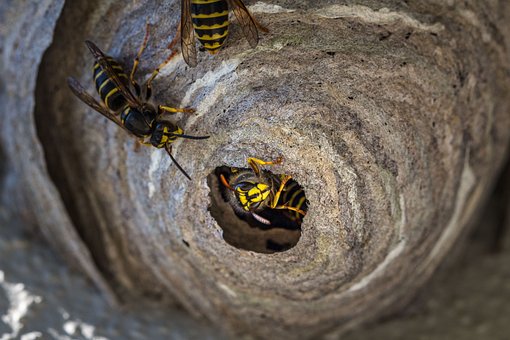
Benefits and Risks of Wasps
Benefits
- Wasps are important predators that help to control populations of other insects, particularly pests that can damage crops and harm other plant life.
- Some wasp species act as pollinators for certain plant species, which is critical for the reproduction and survival of those plants.
- Wasps also play a role in the decomposition of organic matter, which helps to maintain healthy soil and nutrient cycles in the ecosystem.
Risks
- Wasps can be aggressive and defensive, especially when their nests are disturbed, and their stings can be painful and even dangerous to humans, particularly those who are allergic.
- Some wasp species can damage crops, such as fruit crops, and can also invade and damage buildings.
- When wasps become too abundant, they can pose a nuisance and negatively impact human activities and outdoor events.
Frequently Asked Questions
Are wasps important pollinators like bees?
Yes, wasps are important pollinators just like bees. They gather nectar from flowers and help in the pollination process as they move from one flower to another.
Though wasps may not carry as much pollen as bees, they still play an essential role in pollinating various plants.
In fact, some plants rely solely on wasps for pollination. It is important to remember that wasps are not just pests, but they also have ecological significance and contribute to the biodiversity of our planet.
Are there any benefits to having wasps in your yard or garden?
Yes, there are benefits to having wasps in your yard or garden.
Wasps are natural predators of many insect pests that can damage your plants, such as caterpillars and flies. By preying on these pests, wasps can help control their populations and protect your plants from damage.
Additionally, wasps also play a role in the pollination of some plants, helping to promote their growth and reproduction.
Do wasps serve any purpose besides being pests?
Yes, wasps serve many purposes besides being pests. Wasps play an important ecological role in the food chain, as they are natural predators of many insect pests that can damage crops and gardens.
For example, paper wasps and hornets feed on caterpillars and other insects that can harm plants, while parasitoid wasps lay their eggs inside the bodies of other insects, killing them as they develop.
Additionally, some wasp species are important pollinators, helping to transfer pollen from flower to flower as they search for nectar.
Wasps also produce powerful antibiotics in their venom, which could have applications in medicine.
Furthermore, recent research has found that wasps have the ability to remember each other and display social behavior, which is a rare trait in insects and could provide insights into animal behavior and cognition.
How do wasps contribute to the food chain?
Wasps play an important role in the food chain as they are natural predators of many insect pests that can harm crops and gardens.
For example, wasps such as paper wasps, yellow jackets, and hornets feed on caterpillars, flies, and other insects that can damage plants.
Parasitoid wasps lay their eggs inside the bodies of other insects, which later hatch and kill the host as they develop.
This helps regulate the populations of other insects in the environment, preventing them from overpopulating and causing harm to other organisms in the food chain.
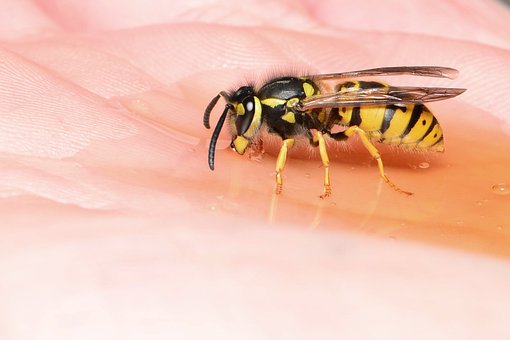
Conclusion
Wasps are often misunderstood and viewed as pests, but they play a critical role in our ecosystem.
They act as natural predators, pollinators, and decomposers, and are an essential part
of the food chain.
While wasps can pose risks to humans, it’s important to remember that they are an integral part of the natural world.
Understanding and appreciating their importance can help us learn to coexist with these often-misunderstood insects and appreciate the many benefits they bring to our environment.

